Apr 24, 2011 | Violence against women
I have a story to tell and it is not so nice
It’s about when I fell and it was not on ice
It is about a man whom I loved very dear
But as the year went on, he instilled in me a fear
In the beginning he was kind and easy to love
Quite refined and gentle as a dove
Then without warning, I was totally unaware
He punched my face and pulled my hair
He struck me again and again, until I hit the ground
There was no one to help me, not a soul around
This violence went on for many years
I sat there in silence and shed plenty of tears
It did not matter how hard I tried
I always had bruises that I could not hide
I was afraid to move, afraid to talk
Tired of all the people who liked to gawk
All of the guilt and all of the shame
Yet I wasn’t the one inflicting the pain
When I heard the doctor, I thought it was a lie
The doctor stated, “The man is going to die”
I would pray to God that this nightmare would end
I never had no one to trust, not one friend
Then one day God said, “No more”
He took him to Heaven and picked me up off the floor
– Rhonda Vermette
Apr 21, 2011 | Battered Women's Support Services, BWSS Programs, Violence against women
Recognizing, Understanding and Addressing Economic Abuse
By Sara Yasan,
Manager, Training and Strategic Interventions
A complex combination of social, psychological, cultural, familial and economic factors contribute to a woman’s decision to remain in, leave and/or return to an abusive/violent relationship. Beside fear of losing their children, women who live with violence and abuse, frequently cite income, employment and financial stability as the strongest, most immediate deterrents to leaving abusive situations.
Impacted by the legacy of debt and imposed bankruptcies, even after leaving an abusive relationship, many women struggle to eat, find a safe place to live, achieve academic goals, support their children and rebuild their lives.
To understand the dynamics of financial abuse and the experiences of women survivors, we ought to recognize that financial abuse takes many forms. In fact, financial abuse is a common tactic of power and control in abusive relationships, which enables an abusive partner to control women by preventing or restricting her access to money, employment or other financial resources.
Abusive partners are motivated by the need for control and willing to use force, coercion or violence. Financial or economic abuse occurs when an abusive partner attempts to take total or partial control of woman’s financial resources, including money, property, an inheritance or employment income as well as prevent her from having access to, or making decisions for her own financial resources.
BWSS Economic Empowerment Strategies for Women: Recognizing and Addressing the Effects of Financial Abuse initiative explores and addresses the impacts of financial abuse on the lives of women.
Our objective through this initiative is to equip women survivors of violence, advocates, other frontline workers, policy analysts and other systems, institutions and government entities with strong analysis, practical resources, and information grounded in the lived experiences of women; through gaining these knowledge and skills these civil servants are better able to enhance women’s ability to engage in all levels of society; and, they are more capable of assisting women who are living with violence and abuse in achieving financial safety.
In order to ground ourselves in the experiences of women, through the month of April 2011, women who access our services were invited to take part in focus groups. Women were invited to share their stories and struggles as they experienced, and continue to experience, the impact of financial abuse.
The first session of the focus group series were held on April 7th, 2011. Nearly 40% of the women who participated in the group were either Indigenous or Immigrant women. Each woman passionately shared her story in the group, some for the very first time. Women described the many challenges they had faced, and continue to face, as the result of living through financial abuse. They shared the impact of financial dependency on their abusive partners, who were using financial abuse as a tactic of power and control. This economic dependency, however, is reinforced by societal and systemic gender discriminations that limits or denies women the opportunities to have access to and participate in the labour market and earn equal wages as male counterparts.
Women’s narratives highlighted that while financial abuse might not be as obvious or observable as other types of abuse, it profoundly impacts the safety and well being of women. Whether manifested through lack of access to some of the most basic life necessities like food and clothing and safe shelter, or marked by the systemic denial of access to financial resources, information and education, economic and financial abuse have a serious and lasting impact on women.
BWSS’ Economic Empowerment Strategies for Women: Recognizing and addressing the effects of financial abuse is holding two more focus groups in the month of April.

BWSS’ Economic Empowerment Strategies for Women is funded by:

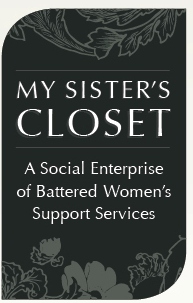
Founding Sponsors:


Apr 20, 2011 | Battered Women's Support Services
In 2009 I found the courage to escape my abuser shortly after discovering I was pregnant. When I left, I was so traumatized that I couldn’t even carry a proper conversation.
Next began the daunting task of rebuilding my life, which included the legal system. I had never dealt with anything like it before and felt powerless. I spent a lot of time crying and complaining about how unfair the process was. Finally, I came to the realization that no one was going to do this for me. If I wanted my life back, I would have to take action.
I started doing research. I looked into countless resources and eventually found Battered Women Support Services. Their legal advocacy services were probably the most important support I had. They put me in touch with appropriate representation and helped me acquire knowledge on how to navigate the legal system.
This gave me some control over my situation and began a snowball effect. I started to regain my confidence. I began to feel empowered and knew my voice had to be heard. As my self esteem grew, I became motivated to make positive changes in my life, including pursuing my education. All of these things have been important not only because they’ve help me improve my life, but they also gave me creditability in court. I gained the strength to stand up to my abuser in court. I knew that I would be believed!
My battles in court are still ongoing and it is possible that I may have to do this many more times in the future. However so far I have done well and my abuser has yet to gain access to my daughter. Had I not had help from legal advocacy and become informed, I am certain the outcome would not have been as positive. Although this experience may be one of the most difficult things I’ve ever been through, it has also been the most valuable. It has taught me that I am capable of success and that I can protect myself and my child.
Apr 18, 2011 | Battered Women's Support Services, Events, Violence against women
Urban Women’s Anti-Violence Strategy
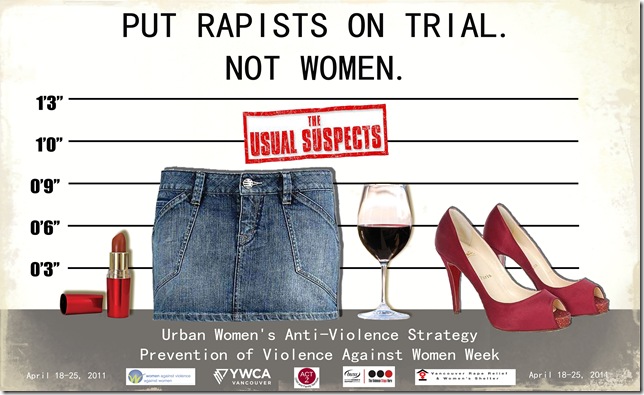
Sexual violence, it seems, is the one crime where we blame the victim and not the perpetrator. Frequently, women who are attacked are told, “You should have been more careful,” or, “You shouldn’t have put yourself in that situation.” Routinely women who have been raped are asked the questions “WHAT were you wearing?” “What did you drink?” “Who were you with?” “Why couldn’t you sense a potential attacker?” Research tells us that sexual violence perpetration is a heavily gendered crime. Approximately 98-99% of sexual violence – reported to police or anonymously reported in research – is perpetrated by men. And we don’t ask the question “Why do men rape?”
Recently, there have been several instances where public officials have publicly exposed victim blaming sentiments and have faced consequences:
In Toronto, Students and staff at Osgoode Hall Law School are demanding an apology and explanation from the Toronto Police Service after one of their officers suggested women can avoid sexual assault by not dressing like a “slut. http://www.torontolife.com/daily/informer/city-sindex/2011/02/17/toronto-cop-reportedly-tells-students-to-avoid-sexual-assault-by-not-dressing-%E2%80%9Clike-a-slut%E2%80%9D/
In Winnipeg, protesters call for resignation after judge allows victim blaming sentiments inform his sentence of a convicted rapist http://www.youtube.com/watch?v=JBxodavkiJc
In Manitoba ‘No woman asks to be raped’: Victim slams judge’s decision
http://news.nationalpost.com/2011/02/25/no-woman-asks-to-be-raped-victim-slams-judges-decision/
In Vancouver, BC, Women Respond to Comments by Reverend Ric Matthews of First United Church
http://vancouver.mediacoop.ca/newsrelease/6496
In Surrey, BC, Green Party Candidate resigns over rape comment
http://www.thestar.com/news/canada/politics/article/974569–green-party-candidate-resigns-over-rape-comment-on-facebook
The New York Times was blasted by readers after this article:
Cleveland Texas Rape Case
Igniting a response with analysis like this :
MS Blog
Forcing the New York Times to print this :
Without Balance
In the US, an alliance of men have spoken out against victim blaming and issued a call to other men
http://www.kevinpowell.net/blog/2011/04/men-speak-out-about-sexist-coverage-of-rape-a-call-to-action/
This year, Urban Women’s Anti-Violence Strategy an alliance between Vancouver Rape Relief and Women’s Shelter, Act II Safe Choice, Women Against Violence Against Women (WAVAW), YWCA Munroe House and Battered Women’s Support Services (BWSS) have teamed up again to focus on sexual violence against girls & women.
To participate in the conversation and to take action check out BWSS Battered Women’s Support Services Facebook page BWSS Facebook Group and follow us on Twitter here Ending Violence
Prevention of Violence Against Women Week – April 18 to 25, 2011.
Urban Women’s Anti-Violence Strategy
Over the years, Vancouver and the province of British Columbia has experienced a death by a thousand cuts as services and the network of support for women survivors of violence are being dismantled. Further the pursuit of liberation and equality for women remains elusive as systemic policies and practices are regressing while violence against girls and women continues as an epidemic.
In 2009, in unprecedented form, the feminist women’s organizations in Vancouver joined together to raise awareness by holding events and mobilizing direct action during Prevention of Violence Against Women Week in April.
We’re working to provide critical and essential support services, while working to end violence against girls and women.
To join our work email us at endingviolence@bwss.org.
Urban Women’s Anti-Violence Strategy 2010 Death Does NOT Become Her
Urban Women’s Anti-Violence Strategy 2009 Critical and Essential Services
Apr 18, 2011 | Battered Women's Support Services
Inspiring Stories, Amazing Women, Ending Violence
By Angela Marie MacDougall
Think about Battered Women’s Support Services as concentric circles or a web of interconnected experiences, lives and stories steeped in survival, hope and effective change. At the centre are women who access our services, on a continuum of living with power and control including physical and sexual violence. Women who are seeking safety, living the complex reality of staying in an abusive relationship with the hope that “he will change”, leaving for a while, getting a taste of freedom and being pulled back by fear, societal pressures, systemic barriers, returning with the hope that “things will change”.
Throughout that process reaching out to lean on another through our support groups, our crisis line, our counselling, our legal advocacy, our workshops, our employment program, our specialized services and finding other women who are also finding a sense of personal power and empowerment. Who are living free of violence.
Statistically, women will stay, leave and return seven times before leaving for good, and some women never leave. As one 86 year old woman said, “if I had support like I have received at BWSS when I was younger I would have left a long time ago.”
Yes, all women of all ages, 14 – 86 who are dealing with power and control in their relationships including sexual and physical violence access BWSS. Each woman, or girl, with a painful journey of injustice and harm who are writing strength, survival and hope into their story through their contact with Battered Women’s Support Services, this year well over 8,000.
Women Who Volunteer
Women who volunteer with us who are also on a continuum who through their experiences have decided that they want to connect or reconnect with a community of women giving back to help other women find a way to live violence free. On Thursday, March 31, 2011, eight-six women attended our annual Volunteer Appreciation Event. Though we like to think we are demonstrating appreciation to women who volunteer with us every day, our annual event is the only time when all volunteers, staff and board members get together to acknowledge, recognize and celebrate.
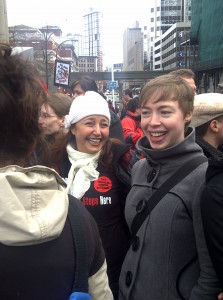
Women who volunteer at BWSS are a true reflection of our communities and tell the story of women’s survival and women’s liberation. This year was our biggest and best event ever. With the microphone open, women shared their stories of the connections, relationships and positive impact volunteering at BWSS has made in their lives and the impact they’ve been able to make in the lives of other women, children and men.
Staff Team
Our staff team, women who are committing their lives to the work of ending violence against women as a personal mission statement dovetailing with the mission of Battered Women’s Support Services. Indigenous women from Indigenous communities in Canada reaching out to Indigenous women living in the urban settings and on reserves linking the abuse in their intimate relationships to the very making of this nation as a nation and that personal safety is linked to Indigenous sovereignty. Recent Immigrant women delivering information, counselling, support groups in languages including Farsi, Punjabi and Spanish integrating critical cultural nuances that speak deeply and profoundly. BWSS Women counsellors working with women who are so impacted by lives filled with physical and sexual violence the trauma lives deep inside well after the abuser(s) have left assisting women unravel the experiences, piecing back together that which has been fractured, shattered…
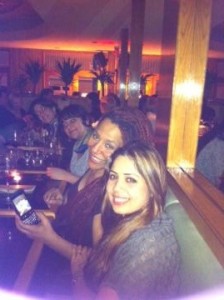
Board Members
Our board members, strong women leaders, leading change in their respective professional and personal lives while lending their wisdom and guidance to the governance and strategic direction of Battered Women’s Support Services. Strong leadership growing authentically from years of experience ending violence in the diverse communities of women and feminist organizing.
Ending Violence
And the activism, BWSS staff, help women prepare, then accompany and successfully advocate for Refugee women to achieve refugee status, when after 20+ years of dismissing deaths of marginalized women (disproportionately Indigenous women) our staff who occupied the Vancouver Police department and said in no uncertain terms “enough is enough”, our staff who stand up to government policies like changes to Family Relations Act, restructuring of Bridging Employment programs, changes to immigration sponsorship that will disproportionally impact abused Immigrant women, proactively addressing bad practices in co-ed emergency shelters where women have been sexually assaulted, our staff who take the streets to stand up for women who are missing and who didn’t survive. And will do it again, in a moment’s notice.
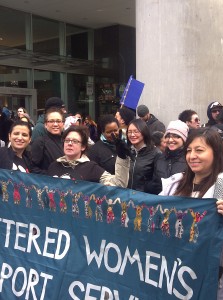
Each amazing woman with a story of overcoming, embracing and embodying survival and empowerment; grounding herself in her personal experience fueling her forward to effective change in her life, in her relationships, in her community and in the larger society, like ripples in a pond reaching our larger community regionally, provincially, nationally and internationally.
Our current issue of Women Making Waves is going to print; it has taken a while to get to this issue because we’ve been busy ending violence against girls and women. In this issue we celebrate our positive and effective change, inspiring stories, and all the amazing women who are ending violence.










